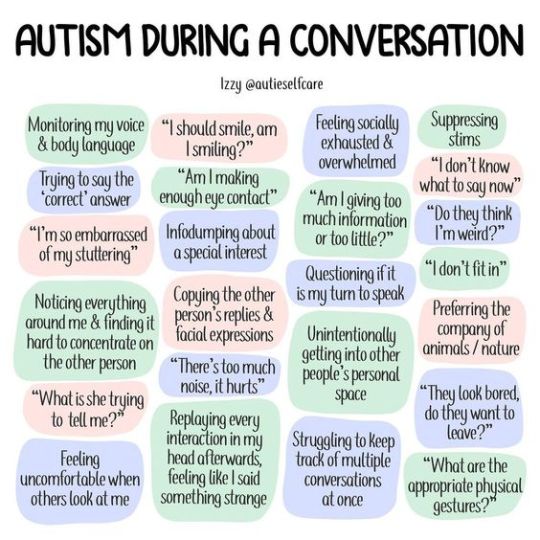#Asd women
Text
I'm tired of people getting butthurt over everything. It seems like it's all you see on social media. Every week it's something new to be fake-ouraged about or just looking for reasons to be outraged (some are valid). Like it's damaging and poisoning everything. I just want to live my life. It's getting really depressing and old. When there is something cool or interesting there is always someone with a reason for why it's "not". I'm just so over it. Seriously, it's depressing and idk how y'all live. 😔 I don't understand...🤕 People not on social media tend to be happier. Guess they are on to something because sensory overload \overstimulation is a bitch.
Everyone online has some kind of stick up thier ass. Everyone is fragile. No one seems to want to live. Instead, they rather get in their imaginary soapbox and act holier than thou. It's so maddening how "woke" we've become only to appear more asleep. Are we happier by walking around like we got something to prove all the time? No, I don't think so because the same people who go about like thier shit don't stink seem to be the most miserable. Thank you social media.
#my life#social commentary#depression#anxiety#women on the spectrum#asd women#mental illness#im so tired
4 notes
·
View notes
Text
People always talk about how childhood autistic traits can be troubling and problematic for people (especially allistic parents) but how about ways childhood autistic traits can be helpful and convenient for parents? I’m putting some examples below from my childhood.
- my need for routines was helpful to my mom and made her life easier
- my ability to hyperfocus on interests and solitary activities allowed my parents to attend to my sister
- my preference for being with adults who were more predictable made me easier to handle
- I had a very strong internal sense of right and wrong that made me easy to reason with as long as I was given a reasonable explanation
- my difficulty expressing my emotions and internalizing them instead made me seem low maintenance
- compared to my sister who is very reactive my atypical responses weren’t noticeable
- because I was so independent I was easy to leave alone and overlook
- because my traits weren’t disruptive to my parents I was just seen as ‘mature,’ ‘smart,’ and ‘an old soul.’
- even though I was only social when people interacted on my terms I didn’t avoid people so I wasn’t seen as antisocial
- I talked so much that if I had a day I was struggling no one noticed because they were just used to me being chatty
- I had a decent early childhood before things got really challenging so my meltdowns weren’t bad or often at that age
- by the time I was at an age where those things would stand out I was more prone to disassociation and then having a meltdown when I was alone so they didn’t know
If anyone has any childhood autistic traits that were convenient to their parents and overlooked because of it please let me know in the comments! ⬇️
#actually autistic#autistic experiences#self diagnosed autism#autistic women#late diagnosed autistic#invisible disability#actuallyautistic#autism#asd#autistic community#sensory issues#disability#ableist bullshit#autistic meltdown#sensory overload#spoonie#emotional dysregulation#being autistic
5K notes
·
View notes
Text
THIS IS THE MOST ACCURATE THING I'VE SEEN TODAY

#autista#autistic spectrum#autistic people#autism#neurodiverse#to other autistic people#actually autistic#autistic#autistic culture#actuallyautistic#autistic feels#autism problems#autistic women#autistic things#autistic experiences#autistic community#late diagnosed autistic#autistic adult#actually autism#asd#autistic problems#autistic positivity#neurodivergent#autism blog#neurodiversity#autism advocacy#autism diagnosis#autism spectrum disorder#autistic questions
5K notes
·
View notes
Text
I'm upset with tiktok. Particularly the mental health aspect of tiktok. It's so inaccurate most of the time but people act like it's not. You shouldn't take mental advice from tiktok. Tiktok is partially responsible for setting back the public's perception of OCD, we were gaining traction in helping people understand that intrusive thoughts don't make us, killers, creeps, or dangerous.
Now we've got tiktok people telling everyone that intrusive thoughts are about wanting to eat too much candy, or poke a Llama in the face because it's so cute. No those are just thoughts, normal thoughts, impulsive thoughts.
They are likely not ego dystonic. They likely do not clash with your sense of self, you most likely do not have a negative or anxious reaction to these thoughts. Intrusive thoughts are unwanted, scary, distressing thoughts that pop into your mind randomly and you don't want them.
People with ocd can't control their thoughts, but now we have people calling OCD people and people with other conditions monsters because they have real intrusive thoughts that follow a common theme, hurting others, doing something bad or perverted. Or something you don't want to do, it can even be thoughts about joining another religion or secretly being a sexuality and not knowing it.
Intrusive thoughts can be anything, but they are always unpleasant and unwanted, they are considered to be ego dystonic meaning they do not go along with a person's sense of self.
When I was younger I would have thoughts about pushing people into the street and them getting run over by cars, I hated those thoughts. I didn't want them, those were intrusive thoughts. Tiktok has harmed OCD acceptance and imagine what it's going to do to Autism, which I also have, if people keep taking advice from tiktok. Please don't take tiktok advice
#actually autistic#autism#autistic adult#autistic experiences#autism level 2#late diagnosed autistic#autistic women#autism diagnosis#asd#autistic#tiktok#actually ocd#ocd#intrusive thoughts#obsessive compulsive disorder#mental illness#fyp#mental health
549 notes
·
View notes
Text
Yeah the stereotype of every autistic person being a super genius who has a hard time communicating and conveying their thoughts into vernacularly understandable words has got to die like, now.
2K notes
·
View notes
Text

#autism#actuallyautistic#neurodiversity#autism community#autismmeme#asd#autism spectrum#neurodiverse#neurodivergent#on the spectrum#its the neurodiversity#autism pride#autismcommunity#autism life#autistic#autisticcommunity#autisticmemes#female autistics#autistic women#female autism#socializing#social issues#autism and friends#unsocialized#social problems#friendships#autism memes
497 notes
·
View notes
Text
She's just a little different
She's a bit perticular
She's quirky
She's excitable
She's childish
She's kinda weird
She's really sensitive
She's a very anxious person
AUTISM
Its been autism this whole time, hasn't it?
#asd#questioning asd#autistic women#autistic things#autistic adult#autism#undiagnosed autistic#undiagnosed neurodivergent#undiagnosed autism#childhood trauma
235 notes
·
View notes
Text
Women and Girls with Autism Spectrum Disorder: Understanding Life Experiences from Early Childhood to Old Age (Sarah Hendrickx, 2015)
“Interestingly, one of the findings from research into sex differences in children with autism was that girls with autism do not have the same stereotypical, rigid interests as boys.
My research certainly found that repetitive and restricted behaviours were completely the norm for the girls studied but that topic type differed.
A small number of activities came up time and time again as being favourites for repetition: watching the same TV/video/DVD programme (e.g., Mary Poppins, Postman Pat, Peppa Pig), reading the same book (e.g., an Enid Blyton book, Jane Eyre), listening to the same song/tape.
The scripts and lyrics of their favourite shows, books and songs were all known verbatim by the children. Collecting and sorting specific objects were also mentioned. (…)
Boys’ interests tend to be object-based – trains, dinosaurs, space – while girls’ interests tend to be people- or animal-based – soap operas, fictional characters, animals and celebrities.
This qualitative difference can explain why girls’ behaviour may not be noted as being unusual, due to the ‘typical girl’ nature of their interests.
Whereas a boy who quotes endless facts about ancient history, rather than playing football with his peers, may be flagged as atypical, a girl who obsesses about a pop star would not necessarily be seen in the same way.
The difference between the interests of a girl with autism and a typical child is the narrowness of the topic and the intensity of the interest.
These girls with ASD have single-track focus; they do not think or speak of anything other than their passion for an extended period.
They may have extensive knowledge of their subject but have more of a factual interest than a desire to live it out.
A child who speaks of nothing but horses may not actually want a horse, but just enjoys the facts about horses.
I believe that the interest provides the same outcomes for both girls and boys on the autism spectrum; once immersed in your subject of interest, there is a predictability and escape from the chaotic real world.
Knowing everything about a subject makes it known and provides a sanctuary from the anxiety and stress of a feeling of not knowing what’s going to happen most of the time.
Animals in general are a popular interest as they are far easier to deal with than people for many females with autism: their intentions are clear (no hidden agendas), their non-verbal language is minimal (cats don’t pull too many facial expressions), their needs are easily identified and their attachment and affection are unconditional and unchanging.
Some girls identify so strongly with animals that they imagine or wish themselves to be one.”
557 notes
·
View notes
Text
Ya know that autism moment when someone says something that causes a big stir in the room and all of a sudden the noise level gets exponentially higher and there's so much audio input and you wish you could just put everything on mute and now the walls are closing in on you?
#relatable#autism#autism spectrum disorder#actually autistic#asd#autistic spectrum#autistic problems#autistic women#being autistic#asd memes
512 notes
·
View notes
Text
Tell me your stories :)) I’d love to know more. My sister is three years younger and doesn’t have the same issues. As much as I want to leave my house, I couldn’t cross the road apne until I was 14 and I couldn’t take the train alone until I was 16, and even then on practiced routes. Did anyone else have struggles like this?
#autism#autistic#questioning autistic#autistic woman#actually autistic#autistic women#autistic girl#autistic adult#late diagnosed autistic#autistic things#autistic community#poll#asd
151 notes
·
View notes
Text
Thought processing disorder is my life. I have a lot of good shit in my mind but when I try to articulate it with words it comes out like garbage. So when I try to have an intelligent conversation I sound stupid and\or crazy.
When I write my entries I have to try extra hard to articulate everything. It's not as hard as speaking. Even with speech classes it's still difficult.
It's kind of like English is my second language. I joke that my first language was Alien. It probably was because I had words or names for stuff as a kid. Idk or care much about how or why but I feel stupid all the time without having something written or prepared.
5 notes
·
View notes
Text
#actually autistic#autistic experiences#self diagnosed autism#autistic women#late diagnosed autistic#invisible disability#autism#actuallyautistic#asd#autistic community#disability#sensory issues
2K notes
·
View notes
Text
Levels are important and so is using them correctly.
There is a misunderstanding about levels that borders on abelist. Some of you may have seen others say "levels are harmful to low support needs autistics" or "some days I'm level 1, some days I'm level 2 and some days I'm level 3".
These statements are harmful for an assortment of reasons and I plan to discuss some of those today.
First:
Levels are not inherently harmful to lower aupport needs autistics the idea that level 1 means no support needs, is not built into the level system. Level 1s require support, level 2s require moderate support, level 3 requires a lot of support. Instead of attacking the level system, the focus should be on addressing the incorrect belief that level 1s don't need any support. For moderate and high support needs people, levels can be invaluable. It can be very difficult for me, a level 2, to explain how my autism effects me. Being able to tell my doctors and the government, that I am a level 2 takes the pressure of trying to verbalize how my disability impacts me. If you can explain how your autism effects you that's great but many of us cant and that is why levels are important. It is shorthand for low, moderate and high support needs people who cannot put into words how autism impacts them.
Some may say that level 1s will be denied services due to misconceptions, this could be possible, though I know level 1s on SSI and such. However, the diagnostic criteria notes level 1 autistic people need supports as well. The level system is very beneficial for many moderate and high support needs people and the problem that some level 1s bring up are the fault of misconceptions of the level system that would be better addressed by educating those who think level 1s don't need support, than by attacking the level systems.
Second:
"Some days I'm level 1, some days I'm level 2 and some days I'm level 3".
Is a perplexing and disturbing saying. Many people, often level 1s, use this phrase to refer to their bad days and in argument against the level system. Some will say levels are useless because "some days I'm level 1, some days I'm level 2 and some days I'm level 3". They are referring to how stressful, difficult, or painful a particular day is and conflating it with levels , not referring to an actual level change.
This is problematic because that isn't how levels work. It is also insulting because it implies that level 2 and 3s are always having bad days and that our level is a state of a bad day. It also implies that if level 2 and 3s had better days or better environments they would become level 1s. This gives an unrealistic impression of how varying degrees of autism works and contributes to misinformation that can harm the autistic community.
I would like to share an example of something a low support need autistic person said about high support needs people "they have tricked everyone into thinking they can't do more so everyone does everything for them". This horrible statement is fueled by the idea that levels are just a measurement of good and bad days. I am a level 2, I am not the imbodiment of a moderately bad day, I am autistic person who needs moderate support. Please think hard the next time you say "some days I'm level 1, some days I'm level 2 and some days I'm level 3". And ask yourself, what that statement really implies.
#autistic women#autistic experiences#autistic adult#autism#actually autistic#late diagnosed autistic#autism level 2#neurodiversity#neurodivergent#asd#autistic#actuallyautistic#spicy autism#autism diagnosis#autistic spectrum#autistic problems
330 notes
·
View notes
Text

Happy Autism AcceptanceMonth from Kooper and I!
#autism#autism acceptence month#autism awareness#autism spectrum disorder#autistic adult#actually autistic#asd#autistic women#actually audhd#audhd#autistic#autism creature#yipppeeee#yippie#autism memes
239 notes
·
View notes
Note
ON THE TOPIC OF LUCY GRAY COULD YOU MAYBE DO HEADCANONS OF LUCY GRAY WITH AN S/O WHO HAS ADHD/ASD?
AS SOMEONE WITH BOTH, AB-SO-FUCKIN-LUTELY

- WILL listen to you ramble
- writes songs about you and your hyperfixations and sings them to the covey (with your approval ofc<3)
- makes it her mission to find/make you clothes you feel safe in
- strokes your hair as you stim and talk about your interests
- takes you swimming with the covey (will bail and stay with if you don't wanna go)
- dances with you in the meadow
- kisses your forehead and sings you your favorite song when you're overstimulated
- when you're stimming, she is doing it with you with the biggest smile on her face, happy to see you happy
#lucy gray my beloved#lucy gray x reader#lucy gray baird#lucy gray baird x sejanus plinth#lucy gray baird my wifey#lucy gray headcanons#rachel zegler the woman you are#rachel zegler#lucy gray baird x you#lucy gray baird x reader#lucy gray x you#tbsosas#tbosas memes#tbsoas#tbosbas#tbosas#tbosbas headcanons#tbosas headcanons#tbsoas headcanons#lucy gray baird headcanons#i love with#ASD#ADHD#neurodivergent#neurodiversity#i love women
51 notes
·
View notes
Text
i love looking people in the eye until they look back
#thought i wasn't autistic enough when first started my self diagnosis journey because of it#but then i noticed that im fine with eye contact unless they're looking to my eyes too#then i go “NONONONO” and look away#danaë speaks#autism#autistic#actually autistic#autism spectrum disorder#actually audhd#autistic women#asd#actually asd#neurodivergent#neurodiversity#adhd#actually adhd
82 notes
·
View notes